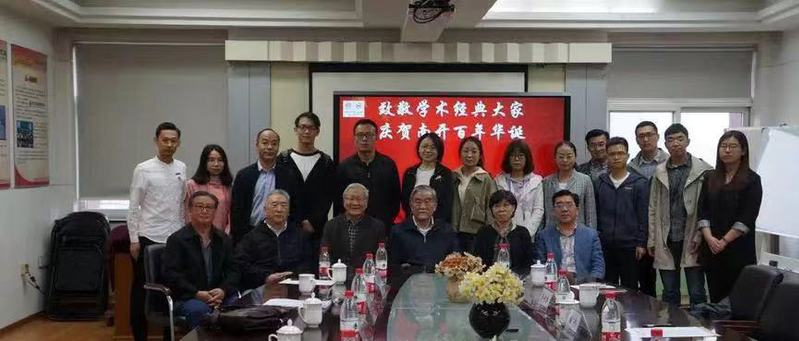[The 100th Anniversary of Nankai University] Symposium on Academic Classics Held Successfully
2019-10-22
(Correspondent: Zhong Yiming) On the morning of October 13th, Symposium on Academic Classics, as the first symposium of Nankai University 100th Anniversary series, was successfully held in the 8th floor conference room of the college.

Party Secretary Yang Qingshan, President Cao Xuetao, Former Party Secretary Xue Jinwen, Former President Hou Zixin and Gong Ke of Nankai University all expressed warm congratulations on the opening of symposium and fully recognized its great significance. The symposium was sponsored by School of Economics and Institute of China Wealth Economics of Nankai University.
To begin with, the host of the symposium, Professor Chen Zongsheng pointed out that this conference aimed to pay tribute to the masters who had made contributions to the development of Nankai economic discipline in the past century, and to review the classic works and articles that left traces in history.

Professor Sheng Bin said, during the celebration of Nankai university’s 100th Anniversary, we were very glad to invite all the experts and scholars to gather together and summarize the achievements made by Nankai economist.
The first stage of the symposium is the re-editing and republishing of two classics, “Nankai Index” and “Chinese National Income (1933)”. Representing Professor Chen Zongsheng, Doctor Zhu Lin and Doctor Ren Zhong introduced and evaluated the major contents.

On the second stage of the symposium, the participating scholars combined with their learning and working experience in Nankai University, freely talked about their own experiences. Professor Emeritus Zhang Rende recalled his three experiences of working in Nankai university for nearly 60 years, expressing his deep emotions for Nankai university and excellent qualities learned from his teachers, Professor Wei Xun and Gu Shutang. Also, Teacher Peng Zhenyuan, retired researcher of Nankai Economic Research Institute recalled the compiling process of the Nankai Index.
Professor Pang Jujin, Director of Collaborative Innovation Center for China Economy, talked about his feelings. His said, Nankai University's centenary was brilliant, with many firsts, which laid the position of Nankai economics in China's modern economic history. Also, Professor Liu Binglian, President of the Institute of Economic and Social Development, recalled his mentor Sang Hengkang, while Professor Junmin Liu praised the enormous influence by his tutor Wei Xun.
“Studying in Nankai gives me an opportunity of growing up with the help of the master,” said by Professor Wang Yuru. She described the experience of visiting economist Wu Sanbao leaded by her teacher Liu Foding. After that, Professor Tong Jiadong, also taught by Professor Wei Xun, introduced the moral character learned from his tutor. He said these precious qualities should continue to be inherited today. Then, Professor Yuan Xin from Nankai Institute of Population and Development, shared the story of his teacher Li Jingneng, who worked in Nankai University for 41 years and made great contribution to population and development research.

Professor Jiang Dianchun, Vice President of the school of economics, recalled his mentor, Professor Chen Yinfang. He felt very fortunate to learn from Mr. Chen and Mr. Teng, who are both the earliest founders of China's world economy and transnational corporation research.
Professor Sheng Bin recalled the invisible and profound impact imposed by his mentor Xiong Xingmei. Professor Xiong not only paid great attention to the construction of team and strongly supported young scholars, but also attached importance to internationalization and the emotion of Family-country.
Finally, Professor Chen Zongsheng summed up the achievements and characteristics of his teacher, Gu Shutang, who is a leading figure in the field of socialist political economy in China. Professor Chen finally concluded that, in the process of reviewing the development history of Nankai, we should also summarize and inherit the experience of the past hundred years, so as to recreate new glories in the future.